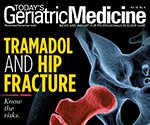 |
Individuals diagnosed with or at risk for glaucoma—the leading cause of irreversible blindness—require twice-yearly monitoring for life to track the progression of the disease. Performed in hospitals, the monitoring requires the use of expensive equipment and is often cancelled or delayed, resulting in avoidable blindness. A British study published in the American Journal of Ophthalmology suggests that home monitoring with a tablet-based eye test may provide the solution.
In addition to reading our e-newsletter, be sure to visit Today’s Geriatric Medicine’s website at www.TodaysGeriatricMedicine.com, where you’ll find news and information that’s relevant and reliable. We welcome your feedback at TGMeditor@gvpub.com. Follow Today’s Geriatric Medicine on Facebook and Twitter, too.
— Kate Jackson, editor |
 |
 |
At-Home Glaucoma Testing
A new study from City, University of London adds to a body of evidence suggesting that home monitoring can address several pressing issues associated with glaucoma.
The study, published in the American Journal of Ophthalmology, is the first to suggest that glaucoma eye tests can be performed accurately at home by patients themselves, using a prototype, tablet-based eye test called Eyecatcher.
According to Pete Jones, PhD, first author of the study and a lecturer at the division of optometry and visual sciences at City, “This is tremendously exciting news. Effective home monitoring would be a win-win-win for patients, clinicians, and the taxpayer alike, and it looks like the technology finally exists to make it a reality. This news is particularly timely, since home monitoring is just one of the ways we can help make the NHS [National Health Service] more resilient and sustainable post COVID.”
Full story » |
 |
 |
Advancing Care With Location Technology
Location technology increases both safety and quality of life for older adults. Read more »
The Valuable Role of Preceptorships in Geriatric Education
A longstanding practice, preceptoring fosters confidence and boosts skills. Read more »
How Surface Testing Empowers Long Term Care Communities
Surface testing is a valuable surveillance tool that can provide early warning of viral outbreak in the environment of a vulnerable population. Read more » |
 |
 |
Fighting the Spread of Germs
Viral Defense, from Integrated Operations, LLC, is a disinfection system that relies on a fine mist of an antiviral/antibacterial solution to mitigate the spread of germs on surfaces, people, and people’s belongings. The units have several applications, including a line of walk-through chambers that detect a person’s presence, apply a disinfecting mist, and leave no residual wetness. Portable units also destroy or inactivate viruses and bacteria on surfaces. Learn more »
Easy Rising
Frail adults or those recovering from injury may have difficulty rising from a chair. SitnStand is a seat designed to make it easier for them to get in and out of any chair with greater ease and confidence. Its ergonomic, air-driven technology provides a surface that rises and lifts, minimizing fall risk and facilitating standing. It’s lightweight and portable and includes a rechargeable battery. Learn more » |
 |
 |
Have a product or service you want to market to geriatricians, other physicians and the geriatric care team of professionals who treat aging patients? Are you a recruiter looking to fill the many geriatric professional openings within a facility, physician practice, or academic institution? Then utilize the reach of Today's Geriatric Medicine to accomplish your marketing goals and fill any open positions.
A resource for professionals looking for new opportunities, as well as those physicians just curious to see what's out there, our Physician Recruitment Center gives physician recruiters a powerful tool to fill partnership opportunities, academic appointments, and hospital staff positions. To support your product marketing or recruiting needs, e-mail our experienced account executives today at sales@gvpub.com for more information or call 800-278-4400! |
 |
|
|
 |
|
|
 |
 |
Exodus From the Field
The pressures and stresses resulting from the coronavirus are causing thousands of doctors to shutter their practices, according to an article in The New York Times. A July survey of 3,500 doctors by the nonprofit Physicians Foundation found that roughly 8% of doctors—possibly 16,000 practices—closed their doors. Many other nurses and doctors are stepping out of medicine due to physical and mental fatigue or fear about their own health.
Tracking the Vaccines
Numerous potential vaccines for COVID-19 are being investigated and developed at an unprecedented speed. Keeping up isn’t easy. However, The Washington Post is tracking more than 200 vaccines and offers a concise overview of the extraordinary efforts.
The Fingerprints of Memory
We all recall or imagine differently, and researchers are closer to understanding why. According to scientists at the Del Monte Institute for Neuroscience, individuals have a unique neurological signature that reveals their particular process of reimagining common scenarios. Through MRI, the differences in individuals’ neural networks can be identified. Further research into these differences may lead to discoveries about diseases such as Alzheimer’s, according to findings published in Nature Communications.
Keeping High-Risk Patients Out of the Hospital
Two monoclonal antibody treatments are being used to help prevent COVID-19 patients from requiring hospitalization. The Philadelphia Inquirer reports on the “logistical, medical, and ethical challenges that could reduce their availability—and patients’ demand for them.” |
 |
 |
 |
A Secure, Anonymous Résumé Bank
Job Alerts Sent to Your E-mail |
 |
 |
 |
Set up Job Alerts and create your online Résumé
to let potential employers find you today! |
 |
|
